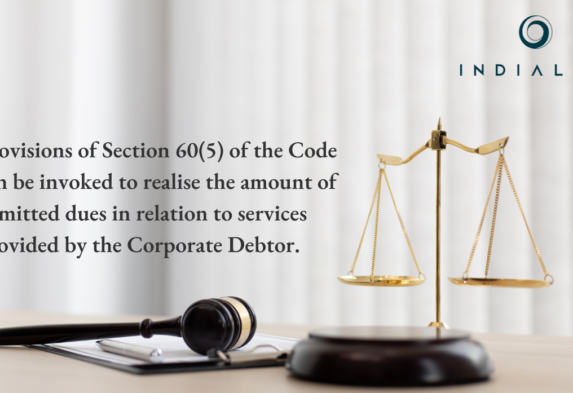Provisions of Section 60(5) of the Code can be invoked to realise the amount of admitted dues in relation to services provided by the Corporate Debtor.


In the case of Vineet K. Chaudhary Vs. NTPC Ltd., the Hon’ble NCLT Mumbai Bench held that provisions of section 60(5) of IBC 2016, can be invoked for recovery of admitted dues payable to the Corporate Debtor instead of Civil Court(s) or arbitral Proceedings to achieve the objects of the Code.
Contentions of the Both Parties:
Applicant’s Contentions:
The counsel appearing for the Applicant contented that the Respondent had issued two work orders dated 17.03.2013 for supply of electrical equipment and installation and erection works respectively in favour of the Corporate Debtor. It was further contended that even after the initiation of CIRP and liquidation, the Corporate Debtor duly completed the installation and erection work in January 2020 and the electrical work in July 2020.
It was further contented that the Respondent failed to pay the outstanding dues of Corporate Debtor amounting to Rs. 22,72,62,756/-. Further it was contended that the Respondent itself has admitted on email that an amount of Rs. 12,34,01,237 is due and payable to the Corporate Debtor.
The counsel appearing for the Applicant further contended that since there was no dispute regarding the Liability of the Respondent to the admitted amount, there is no adjudication necessary and in view of the same, the Tribunal can issue a direction to pay the said amount invoking the provision of Section 60(5) of the code.
Reliance was placed on Hon’ble Supreme Court’s Judgment in Gujarat Urja Vikas Nikam Ltd. V. Amit Gupta.
It was contended that the process of Liquidation is time bound and if the amounts are not distributed to the Creditors within the requisite period, the Liquidation proceedings will fail to reach its conclusion. Thus, the NCLT has appropriate jurisdiction to entertain the application.
Respondent’s Contentions:
The Counsel appearing for the Respondent contended that the Corporate Debtor has not completed the work of supply and erection as per the scope of the contract. Further, it was denied that the Respondent had admitted any amount of Rs. 12,34,01,237/- as payable.
It was the Respondent’s main contention that that the recovery of any amount even if payable is not a dispute related to the insolvency/ liquidation process of the Corporate Debtor. Thus, the Liquidator could not ask the tribunal to be a fact-finding court and adjudicate the disputes in relation to recovery of money. In doing so, the Tribunal is being asked to act beyond its jurisdiction.
The counsel appearing for the Respondent relied on Ramachandra D. Chaudhary V. Bansal Trading Co. & Ors., It was contended that it was held by NCLAT that remedy for recovery of debts, disputed or not, cannot be determined by summary proceedings. Further, any steps taken u/s 60(5) of the Code would tantamount to bypassing/short-circuiting the judicial proceedings.
Observations of the NCLT
The NCLT observed that the Respondent had unequivocally admitted in an email its liability to pay the aforementioned sum to the Corporate Debtor. Thus, there exists no dispute for the concerned amount.
The Hon’ble Supreme Court in the case of Gujarat Urja Vikas Nikam Ltd. (supra), had held that the important object of the Code is to bring the insolvency law in India under a single unified umbrella. It was further observed that on-obstante clause in Section 60(5) is designed to ensure that NCLT alone has the jurisdiction when it comes to applications or proceedings by or against the Corporate Debtor.
It was observed that there is no dispute that the Process of CIRP or liquidation is a time bound process. Any delay in the same leads to defeat the objects of the code. Thus, it was further observed that if the Liquidator is relegated to civil court(s) or arbitral proceedings, it would cause delay in the Liquidation process thereby defeating the objects of the Code. It was also observed that the Corporate Debtor continued to render services despite the initiation of CIRP against it and the liquidator is seeking to realize the dues.
It was further observed that the respondent’s reliance on Ramachandra D. Chaudhary V. Bansal Trading Co. (supra) was misplaced. It was stated that in the said case there was a genuine dispute with respect to payment of outstanding dues. However, in the present case there existed no such dispute and for undisputed liabilities, the parties cannot be driven to unnecessary litigation.
Decision of the NCLT
The Hon’ble NCLT partly allowed the application directing the Respondents to pay the admitted liability. Further, the liquidator was allowed under section 33(5) of the Code to initiate legal proceedings for the remaining amount.
Conclusion
Thus, the NCLT under the provisions of Section 60(5) of the Code can direct the parties to pay admitted dues against the service rendered by the Corporate Debtor.
1. (2021) 7 SCC 209.
2. 2022 SCC Online NCLAT 360.




